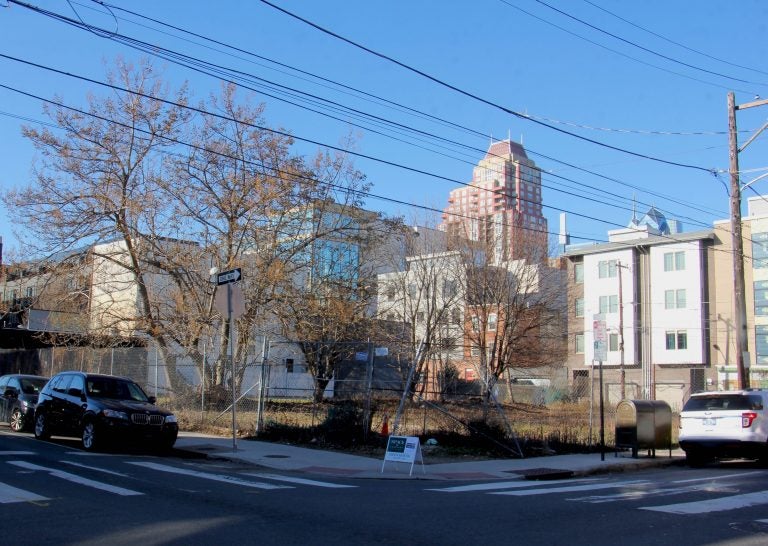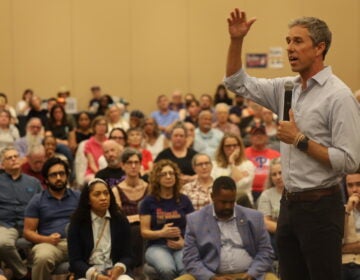South Philly lot named in Kenyatta Johnson indictment to hit market ‘very soon’
The city of Philadelphia is moving forward with plans to develop housing on land at the center of a federal corruption case.

The empty lot at 13th and Bainbridge Streets in South Philadelphia. (Emma Lee/WHYY)
At 13th and Bainbridge Streets, the liminal border between Center City and South Philadelphia, sits a spacious vacant lot worth millions of dollars.
It’s a rare empty lot in a neighborhood where property values have shot through the roof in the last 10 years — and it plays a central role in federal prosecutor’s case against Councilmember Kenyatta Johnson, his wife Dawn Chavous and officials at Universal Companies, the nonprofit developer that owned the land for 14 years until the city seized it last year.
But after years of inaction, the city is ready for a buyer able to transform the vacant lot into a housing development that will include some units at affordable rates as well as those available at market rates.
The Philadelphia Housing Development Corporation will issue a Request for Proposals “very soon,” said Jamila Davis, a spokesperson for the agency.
The move pleases residents like Susan Foster, who feared another high-end townhouse development unaffordable to longtime residents.
“There’s a lot of redevelopment for rich people around here,” said Foster, who lives a few blocks to the north. “Around here you can’t afford nothing unless you hit the lotto.”
Why a ‘prime lot’ stayed empty
The city’s forthcoming RFP seeks a developer able to execute a plan for mixed-income housing, first put in motion decades ago when the Philadelphia Housing Authority leveled a high-rise complex at 13th and Fitzwater streets in 1999.
PHA’s vision was to replace Martin Luther King Jr. Plaza, and other nearby PHA units, with new rowhouses designed to fit into the surrounding low-rise, brick-faced blocks and be sold or rented at affordable rates.
But the housing authority sought help in fulfilling the plan and ended up contracting with Uni-Penn — a collaboration between Universal and the national affordable housing developer PennRose — to build 109 single-family homes as part of the project.
In early 2005, the 1309-1313 Bainbridge Street parcels were sold to the nonprofit for $3 with the stipulation that the land could revert back to city control if it sat unused.
But then, as the rest of the project was completed and the 109 homes were built elsewhere, the Bainbridge properties remained undeveloped in the midst of a development boom.
By 2014, the Philadelphia Redevelopment Authority had enough, and sought to reclaim control so it could turn the trash-strewn lot into the housing always envisioned.
That’s when Councilmember Johnson entered the picture, according to the federal indictment.
According to prosecutors, the city agency called Johnson to seek his support, bowing to the practice of councilmanic prerogative that gives district members power over land use in their area.
But Johnson’s wife was working as a consultant for Universal at the time, and federal authorities allege that Chavous contacted her boss, Universal’s former CEO Abdur Rahim Islam, to warn him about the impending city seizure of the Bainbridge Street lots.
“Shortly thereafter, [Kenyatta Johnson] advised the PRA that he would not support the reversion, which had a chilling effect, and halted the reversion process,” the indictment reads.
This incident is one of two cases where federal prosecutors allege that Johnson used his powers over land use in his district in order to repay a favor to Universal.
Johnson and Chavous deny all allegations and are fighting the two bribery charges against them.
The councilmember said through a spokesperson that his position on the lots has never wavered.
“Councilman Johnson has always supported some combination of affordable and public housing for that site,” said Ben Waxman in a statement. “This neighborhood [Hawthorne] is rapidly gentrifying, but it has traditionally been a working-class African American community. Councilman Johnson believes that affordable housing must be preserved and expanded in this neighborhood.”
In the five years since the city first tried to reclaim the lots from Uni-Penn, the lots have languished further. While nearly all the other vacancies on the block have filled in with new houses, city records show numerous past violations on the property for unkempt grass and unsightly detritus.
A spokesperson for PennRose said the relationship between them and Universal has stagnated, and that they haven’t collaborated on anything in over a decade. A spokesperson for Universal had no comment on the history of the Bainbridge properties.
Local residents don’t know anything about the drama in the indictment. For them, the empty lot is just an annoyance.
“People are always throwing their trash in there, leaving their junk, it’s kind of a pain for us,” said Mike Singh, manager of Gennaro’s, the pizza parlor that shares the block with the empty Bainbridge properties. “There’s a lot of garbage. It’d be nice if there was a building or something there.”
Raed Nasser of the Hawthorne Empowerment Coalition said he can’t recall any developer expressing interest in the lots since the early 2010s.
Instead, his group asked Johnson to turn it into a temporary community park or garden, but the talks didn’t go anywhere.
“We have had a talk with the councilman to build a park, take the fence down, have an open space where people can sit down,” said Nasser. “But his team says it’s a prime lot.”
WHYY is your source for fact-based, in-depth journalism and information. As a nonprofit organization, we rely on financial support from readers like you. Please give today.







